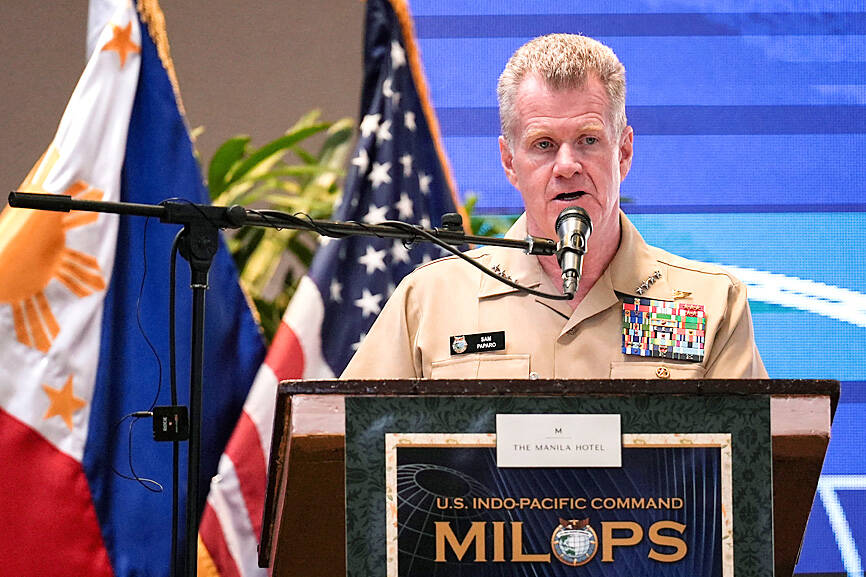China sabotaging submarine cables near Taiwan underscores the US’ need to bolster Taiwan’s telecommunications infrastructure and monitor vessels in the Taiwan Strait, the top US Indo-Pacific commander said.
Admiral Samuel Paparo, who heads the US Indo-Pacific Command, made the remarks at a US Senate hearing after Taiwan on Friday for the first time indicted the Chinese captain of a Togolese-registered vessel that allegedly severed an undersea communication cable linking Taiwan proper and Penghu in February.
US Democratic Senator Jacky Rosen asked the admiral to elaborate on attacks by Chinese ships on Taiwan’s undersea cables.

Photo: Reuters
Paparo said that severing the cables is part of China’s “gray zone” activities directed against Taiwan that fall short of war, but could destabilize the region and serve as a prelude of war.
The use of its maritime militia in the operations enabled Beijing to damage a state’s “information enterprise ... without potentially signaling an intent to go to war,” he said.
US intelligence services need to penetrate locations vulnerable to cable attacks to detect and deter such operations before they could be launched, Paparo said.
In addition, the US should develop redundant capabilities in the form of low and medium Earth orbit satellites to ensure that communication between Taiwan and the US and its allies are not dependent on cables alone, he said.
Washington’s efforts should be oriented toward bolstering Taiwan’s resilience so that China could not isolate Taiwan even if the US failed to prevent submarine cables from being cut, he said.
Separately, Paparo said the Chinese Liberation Army (PLA) last year saw significant growth in its capabilities in continuing its campaign to menace Taiwan.
PLA forces engaged in harassing activities in the Taiwan Strait and beyond has increased threefold from previous years, he added.
Chinese military activities around Taiwan proper is more properly defined as rehearsals for invasion than drills or exercises, he said.
Beijing’s aggressive posture has backfired as it has drawn global concern and spurred Taiwan to accelerate its defense, Paparo said.

The manufacture of the remaining 28 M1A2T Abrams tanks Taiwan purchased from the US has recently been completed, and they are expected to be delivered within the next one to two months, a source said yesterday. The Ministry of National Defense is arranging cargo ships to transport the tanks to Taiwan as soon as possible, said the source, who is familiar with the matter. The estimated arrival time ranges from late this month to early next month, the source said. The 28 Abrams tanks make up the third and final batch of a total of 108 tanks, valued at about NT$40.5 billion

Two Taiwanese prosecutors were questioned by Chinese security personnel at their hotel during a trip to China’s Henan Province this month, the Mainland Affairs Council (MAC) said yesterday. The officers had personal information on the prosecutors, including “when they were assigned to their posts, their work locations and job titles,” MAC Deputy Minister and spokesman Liang Wen-chieh (梁文傑) said. On top of asking about their agencies and positions, the officers also questioned the prosecutors about the Cross-Strait Joint Crime-Fighting and Judicial Mutual Assistance Agreement, a pact that serves as the framework for Taiwan-China cooperation on combating crime and providing judicial assistance, Liang

A group from the Taiwanese Designers in Australia association yesterday represented Taiwan at the Midsumma Pride March in Melbourne. The march, held in the St. Kilda suburb, is the city’s largest LGBTQIA+ parade and the flagship event of the annual Midsumma Festival. It attracted more than 45,000 spectators who supported the 400 groups and 10,000 marchers that participated this year, the association said. Taiwanese Designers said they organized a team to march for Taiwan this year, joining politicians, government agencies, professionals and community organizations in showing support for LGBTQIA+ people and diverse communities. As the first country in Asia to legalize same-sex

MOTIVES QUESTIONED The PLA considers Xi’s policies toward Taiwan to be driven by personal considerations rather than military assessment, the Epoch Times reports Chinese President Xi Jinping’s (習近平) latest purge of the Chinese People’s Liberation Army (PLA) leadership might have been prompted by the military’s opposition to plans of invading Taiwan, the Epoch Times said. The Chinese military opposes waging war against Taiwan by a large consensus, putting it at odds with Xi’s vision, the Falun Gong-affiliated daily said in a report on Thursday, citing anonymous sources with insight into the PLA’s inner workings. The opposition is not the opinion of a few generals, but a widely shared view among the PLA cadre, the Epoch Times cited them as saying. “Chinese forces know full well that